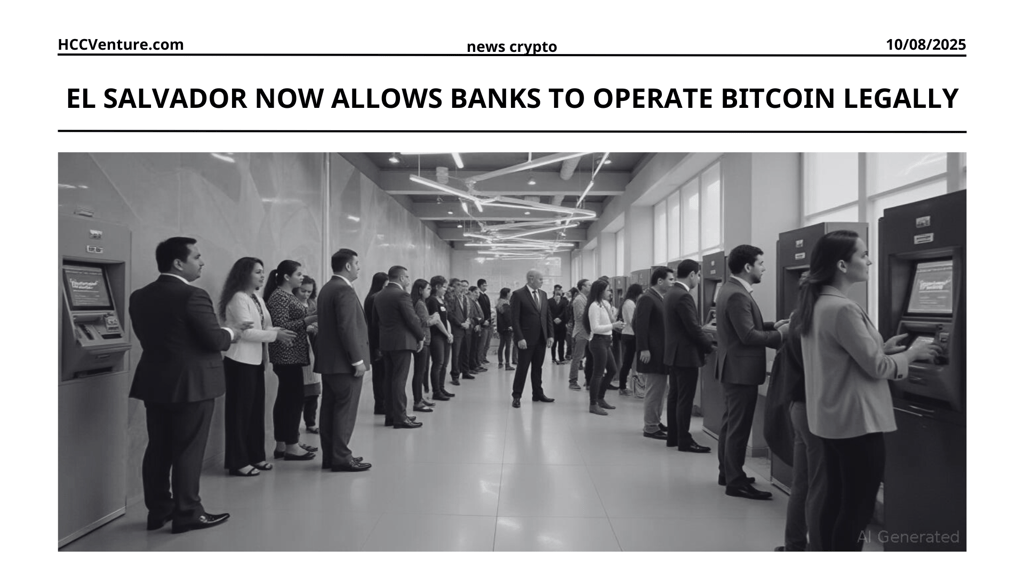El Salvador Now Allows Banks to Operate Bitcoin Legally
Latest reports say that El Salvador has passed a new law that allows investment banks to operate fully as Bitcoin (BTC) banks exclusively for accredited investors.
8/10/20252 min read


Always Leading the Bitcoin Trend
Over the years, El Salvador, the first country in the world to recognize Bitcoin (BTC) as legal tender in 2021 under the leadership of President Nayib Bukele, has continued to push forward with its crypto strategy. El Salvador has created a crypto-friendly environment that includes the Chivo wallet and geothermal energy projects. It has a reserve of 6,262 BTC worth over $730 million, at the current price of around $117,000/BTC. In the new context, these banks, which previously operated mainly in the USD system, are expanding their operations. According to reports from sources such as The CCPress and AMBCrypto, on August 10, 2025, El Salvador enacted a law that allows banks to operate fully as Bitcoin banks, marking a turning point in the country's financial strategy.
El Salvador’s Congress passed the Investment Banking Law on August 9, 1925, announced by Juan Carlos Reyes, President of the National Digital Asset Commission (CNAD). The law allows investment banks to be licensed as Digital Asset Service Providers (PSAD) to operate entirely on Bitcoin for licensed investors. Licensed investors must be individuals or institutions with a minimum of $250,000 in liquid assets and, unlike conventional commercial banks, these banks can provide services such as loans, deposits, and payments entirely in Bitcoin.
The move is part of a crypto-friendly policy from 2021, spurred by international talks with countries like Bolivia and Pakistan to increase cryptocurrency cooperation. To attract large institutional investors, the law requires new Bitcoin banks to have at least $50 million in capital. Initial feedback from the community, especially from platforms like X, has been enthusiastic and optimistic about its potential to attract foreign capital. However, some have expressed concerns about its viability and IMF oversight.
Impact on banking policy?
If Bitcoin banks are fully authorized to operate with Bitcoin, it could turn El Salvador into a global cryptocurrency financial hub, attracting billions of dollars from institutional investors. This would increase domestic and international demand and liquidity, cementing Bitcoin’s status as an asset. With 6,262 BTC in reserve, the country could leverage the new banks to expand Bitcoin’s practical applications, such as business lending or cross-border payments, setting a precedent for other countries.
In terms of the market, this move could increase demand for BTC, reduce circulating supply, and put upward pressure on prices, especially as new banks join in to accumulate. With BTC trading volume reaching $34 billion per day, El Salvador’s participation could encourage other countries, such as Pakistan, to adopt a similar model, accelerating the institutionalization trend. Social media posts expressed excitement, seeing this as a major step forward for global cryptocurrency adoption.
Conclusion and evaluation
El Salvador’s move to allow banks to operate as Bitcoin banks for accredited investors is a major step in the country’s cryptocurrency revolution. In addition to boosting El Salvador’s economy and attracting foreign capital, the move also accelerates the institutionalization of Bitcoin, although this may entail risks and regulatory changes.
Disclaimer: The information presented in this article is the author's personal opinion on the cryptocurrency field. It is not intended to be financial or investment advice. Any investment decision should be based on careful consideration of your personal portfolio and risk tolerance. The views expressed in the article do not represent the official position of the platform. We recommend that readers conduct their own research and consult with a professional before making any investment decisions.
Explore HCCVenture group
HCCVenture © 2023. All rights reserved.

Connect with us
Popular content
Contact to us
E-mail : sp_contact@hccventure.com
Register : https://linktr.ee/holdcoincventure
Disclaimer: The information on this website is for informational purposes only and should not be considered investment advice. We are not responsible for any risks or losses arising from investment decisions based on the content here.


TERMS AND CONDITIONS • CUSTOMER PROTECTION POLICY
ANALYTICAL AND NEWS CONTENT IS COMPILED AND PROVIDED BY EXPERTS IN THE FIELD OF DIGITAL FINANCE AND BLOCKCHAIN BELONGING TO HCCVENTURE ORGANIZATION, INCLUDING OWNERSHIP OF THE CONTENT.
RESPONSIBLE FOR MANAGING ALL CONTENT AND ANALYSIS: HCCVENTURE FOUNDER - TRUONG MINH HUY
Read warnings about scams and phishing emails — REPORT A PROBLEM WITH OUR SITE.
